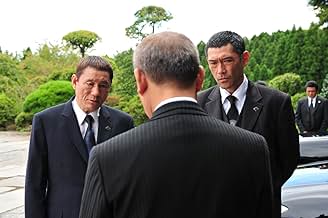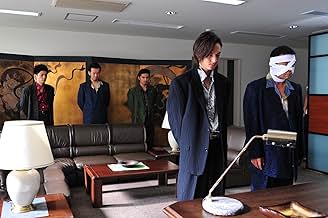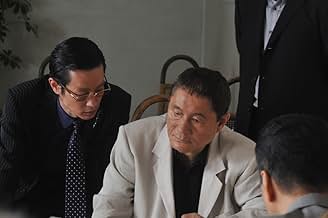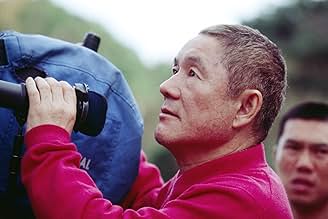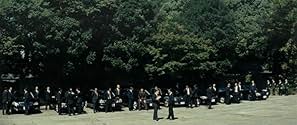Un'allenza interna alle famiglie della yakuza scatena una serie di omicidi a catena fomentati dal desiderio di fare carriera dei boss più piccoli. I cambiamenti saranno più radicali del prev... Leggi tuttoUn'allenza interna alle famiglie della yakuza scatena una serie di omicidi a catena fomentati dal desiderio di fare carriera dei boss più piccoli. I cambiamenti saranno più radicali del previsto.Un'allenza interna alle famiglie della yakuza scatena una serie di omicidi a catena fomentati dal desiderio di fare carriera dei boss più piccoli. I cambiamenti saranno più radicali del previsto.
- Regia
- Sceneggiatura
- Star
- Premi
- 1 candidatura in totale
- Ôtomo
- (as Beat Takeshi)
Recensioni in evidenza
Takeshi Kitano's return to his familiar stamping ground, the Yakuza, their intrigues, vendettas and highly inventive ways of inflicting extreme unpleasantness on one another, was given less than a stellar welcome by critics at the Festival. A common refrain was that there was nothing new on offer here, no new insights, just a retread of the familiar. Well, they are right, but is that really such a bad thing?
I say no, not when we get tough guys, sharp suits, black humour, extreme violence (you might never want to visit the dentist again), a convoluted plot that is hard to follow but has something to do with rivalry, inheriting the reins of power and inflicting extreme violence on the other team. Oh yes, there's also betrayal and extreme violence.
Outrage is old-school Takeshi Kitano, a (for me) welcome return to his glory days, not that he ever left them behind (I've time for all his films, if not his gameshows). If you like the man, as actor or director, then you won't be disappointed by this film, just as long as you are not expecting something new and different, that is.
There are random acts of extreme violence that continue to propel the plot forward. Kitano, playing the underboss Otomo, is a similar role to his other characters in yakuza movies which portray out of control individuals that have a minor standing yet have the last word at the end of the play. Rather than focusing on the beauty of mobsters hiding out on the beach, this is a gritty, urban drama much in the tradition of Johnnie To's triad movies (Election) that has dominated the organized crime dramas over the past decade.
In showing the criminality of the human mind, it evokes Mario Bava's study in Rabid Dogs, similarly Kitano is building a Brechtian inspired drama about the harsh existential life. Kitano continues to explain and further define his worldview through the character of a doomed nihilist anti-hero. In all of Kitano's yakuza character studies, there is no hope, or redemption, only a further plunge into an ugly existence of lies and deceit, where only an act of violence can bring about change.
As Kitano remarked publicly about his making of Outrage, he is giving the people what they want - no pretense of artistic embellishments, but rather blunt, cruel acts of violence of the professional criminal devoid of any romanticism. One scene in particular evokes The Godfather, but that is where the similarities end - there is nothing glamorous about the yakuza lifestyle.
In this film, Kitano assumes the duties as in his other yakuza films as that of star, director, editor and writer. The vision is completely his own. The pacing is deliberately slow, showing that the life of a criminal is not particularly exciting but rather mundane as that of any other type of businessman, mostly involving allegiances of convenience and acts of betrayal. There is no illumination or redemption here, no course of action will lead to a better life, such is the basic tenet of a nihilist.
There is little flourish in the direction such as to immerse the viewer into the dark, banal existence of its characters. The one scene that brings a sense of relief with sunlight streaming through the trees on a backstreet, is colored darkly by seemingly innocent activity that is actually quite sinister for the individuals involved.
This is a welcome and long overdue return for Kitano to the yakuza genre which he abandoned a decade ago for a trilogy of felliniesque introspective autobiographical films. There are no experimental sequences or absurdist imagery as in his previous films. As a consequence, Kitano is no longer held back with meditative musings, instead giving the viewer an unfiltered take on the corruption, lies, and phony existence of the individual in an artificial society - that any person in any social situation is merely part of an inauthentic social contract.
In many ways, the lack of artistic pretense in Outrage only serves to further embolden the bleak message that Kitano has for us. This is not a film for the weak of heart, nor is it one for the impatient, it is a slow revelation revealing the emptiness of life and the pointlessness of all action.
It lacks both the depth and the soul of Coppola's classic gangster film of 1972. Also missing here is Marlon Brando's larger than life Don Corleone; none of the actor's here can come close.
The violence becomes repetitive as do the betrayals which bored me, and the editing seemed haphazard, never developing a coherent flow. The overall production is competent with decent acting but in the end I didn't care what happened to anyone from the chairman down the the many Yakuza soldiers. Everyone is corrupt, including the police, taking bribes to the street criminals looking out for themselves.
Lo sapevi?
- QuizFollowing a string of unconventional, commercially unappealing films, Takeshi Kitano engineered this film specifically as commercially appealing, going back to the genre which brought him the most success, and going as far as imagining the death scenes first and writing a story around them later.
- Citazioni
Ikemoto: H-h-hold on a minute...
[panting]
Ikemoto: I'll reverse the banishment.
Ôtomo: Huh?
Ikemoto: I'll reverse the banishment.
Ôtomo: You banish me, then you reverse it?
[explodes]
Ôtomo: How many fucking tongues do you have?
Ikemoto: Huh?
Ôtomo: Are you deaf? How many do you have?
Ikemoto: I've only got one.
Ôtomo: Only one? *Two* or *three* is more like it, you fucking prick!
Ikemoto: I'm telling you I've only got one tongue!
Ôtomo: [a little calmer] Open your mouth.
[louder]
Ôtomo: Stick out your tongue!
Ikemoto: [beat] Huh?
Ôtomo: [barking] Stick out your tongue!
[Ikemoto reveals reluctantly a bit of his tongue]
Ôtomo: MORE!
[Ikemoto does]
Ôtomo: STICK IT OUT, YOU MOTHERFUCKER!
[Ikemoto sticks out his entire tongue, then Otomo slams his jaw so violently that Ikemoto bites through his own tongue; Otomo then shoots him]
- ConnessioniFeatured in Ebert Presents: At the Movies: Episodio #2.18 (2011)
I più visti
- How long is Outrage?Powered by Alexa
Dettagli
- Data di uscita
- Paese di origine
- Siti ufficiali
- Lingue
- Celebre anche come
- The Outrage
- Luoghi delle riprese
- Chuo-ku, Tokyo, Giappone(Exterior)
- Aziende produttrici
- Vedi altri crediti dell’azienda su IMDbPro
Botteghino
- Lordo Stati Uniti e Canada
- 44.745 USD
- Fine settimana di apertura Stati Uniti e Canada
- 6518 USD
- 4 dic 2011
- Lordo in tutto il mondo
- 8.457.741 USD
- Tempo di esecuzione1 ora 49 minuti
- Colore
- Mix di suoni
- Proporzioni
- 2.35 : 1
Contribuisci a questa pagina





